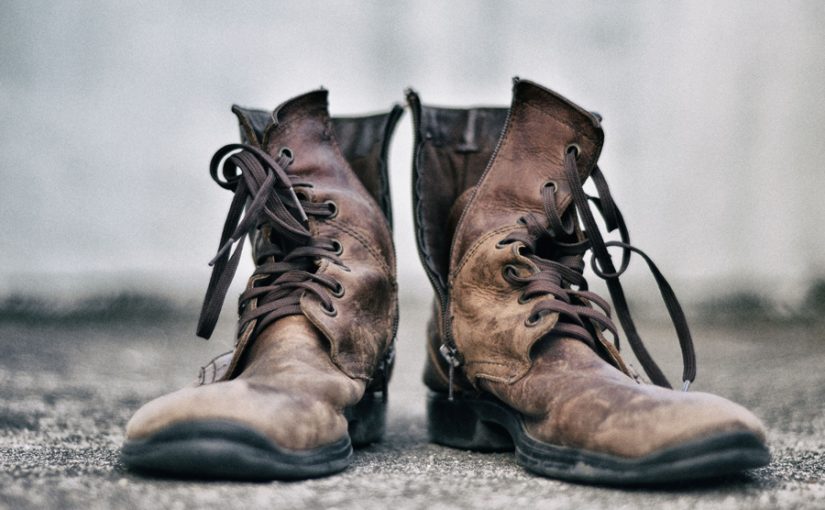A homily for the Twenty-Ninth Sunday in Ordinary Time, October 17, 2021
Is 53:10-11, Heb 4:14-16, Mk 10:35-45
It’s such a cliché: “Walk a mile in someone else’s shoes.” The activity is supposed to give us a sense of what it’s like to be that person, or a person of that person’s ethnicity, or socioeconomic situation, or belief system, but it’s a fundamentally flawed exercise.
I am not, and never will be, anything but a white male human descended from Irish-Welsh-French-Alsatian-Croatian-Slovak stock, raised in the suburban dead center of New Jersey, educated at Catholic grammar and boys prep schools in that aforementioned Central Jersey and at a small, private liberal arts college in the rural dead center of Pennsylvania.
Put me in Manolo Blahnik shoes and I will not be a supermodel. Put me again in work boots atop a pile of hot asphalt and I may labor but I will not be a laborer. Put me in moccasins and — at best — I am guilty of cultural appropriation.
We may try, we may try with every fiber of our being, to walk a mile in someone else’s shoes, but in the end, the most we can hope for is partial enlightenment.
So why try?
If it’s so flawed, then why does this notion persist?
Empathy.
Among the countless great gifts God gave us, each of us was given the ability to be empathetic. Like our other abilities, empathy gets stronger when we practice. When we exercise. When we actively choose to be empathetic, the way Jesus always was, and still always is.
When Jesus walked the Earth, simultaneously true God and true human, he wasn’t trying on someone else’s shoes as some sort of intellectual or spiritual exercise. To save humanity, he had to be human.
He had to be an empathetic, loving human who carried not only all of humanity’s sins when he carried his cross, but also all of humanity’s anger, fears, lust, hungers, despair, and more — all of the negative emotions that can draw people into sinful ways.
He took all of that fetid weight to the grave with him and left it there.
He felt what we feel, a billion times over. He walked that mile to Calvary in our shoes, and in doing so, he gave us a shining example of empathetic service. Of how to serve our sisters and brothers by giving them precisely what they need precisely when they need it.
Because service is born of empathy.
Our Lord served others, even though he more than deserved to be served by everyone ever born or yet to be born.
Because he was empathetic and loving. Because he is Love.
And he challenges us to be empathetic in his mold. To exercise our empathy. To grow it, to mature it. To weave it into every fiber of our being.
True and good service born of empathy attempts to fulfill the needs of the children of God we encounter, whether we go looking for them as an act of justice and charity, or whether we simply realize there are people and a planet in need.
An empathetic relationship can start literally when one of us picks up a vibe from someone. At that point, we are called to do something about what we sense about another brother or sister.
The way Our Lord did, especially during his healing ministry.
It’s important to remember that service born of empathy has rules, that service to others involves boundaries.
Sometimes the best service we can offer is the gift of presence, of silently sharing time with someone in spiritual or psychological pain. Empathy and its cousin sympathy are appropriate when someone is grieving a loss; the heavy lift in cases like this is holding ourselves back from attempting some sort of well-meaning doing too much.
Other times, though, it’s appropriate and often necessary for us to serve by lifting a burden off someone’s shoulders. We cover their shift at work. We help them with child care or yard work or laundry. We donate time and treasure to a food bank.
Our mature empathy not only recognizes the need, it shapes our response.
When we respond to other people’s needs in Christlike empathy, when we attempt to walk a mile in their shoes, we will get only limited insight. But as limited as that insight may be, it will help us exercise and strengthen our empathy.
And maybe, God willing, our service in Jesus’s name will make another person’s figurative shoes a little more comfortable.

So why try?
If it’s so flawed, then why does this notion persist?
Empathy.
**********************************************************
Empathy is often confused with sympathy, but they are not the same thing. Sympathy is a feeling of concern for someone, and a sense that they could be happier. Unlike empathy, sympathy doesn’t involve shared perspective or emotions.
How did Jesus become empathetic? He lived as human experiencing what we are and talking to us for 33 years.
How can we become empathetic ? Dialogue seems a good start. But in this country and even in this church it seems talking in dialogue with others who have different experienes isn’t part of the plan, or have I missed something?
I think one of the barriers to empathy is our willingness — hair-trigger, even — to judge. We rank people according to some ill-formed scale of importance, all of it shaped by excessively competitive cultures. The greatest nation in the world. Champions of the world. The One True Church. Seinfeld — of whom I’m not really a fan — once cynically observed that second place is the first loser. Meanwhile, one of the best articles I ever read in a newspaper was about the man who came in dead last in the inaugural Jersey Shore Marathon. A story filled with empathy about someone who deserved every one of the cheers he got. Thundering cheers for someone who ran, though mostly walked, 26.2 miles in his own shoes.